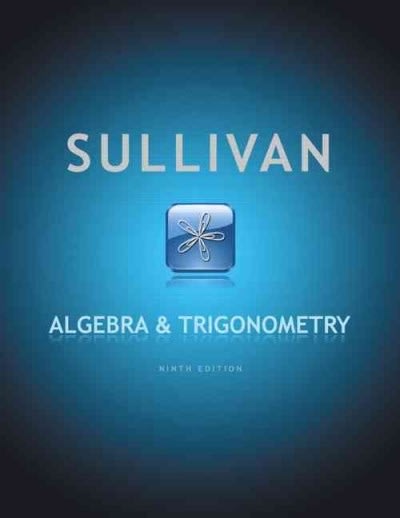Question
Part I: Determine the best hypothesis test to recommend for each scenario presented below. Use the following tests as recommendations: One sample z test, One
Part I: Determine the best hypothesis test to recommend for each scenario presented below. Use the following tests as recommendations: One sample z test, One sample t test, Independent samples t test, Dependent samples t test. (1 point each):
2) A researcher predicted that the Dunder Mifflin Paper Company makes more sales than the average paper company in the United States. To test this, the researcher collects the sales data from a small sample of 6 Dunder Mifflin employees and compares this to the national average of sales from similar paper companies.
3) A professor theorizes that students who chew gum during an exam perform better than students who do not chew gum. To test this theory, the professor uses his class of 20 students, who at random, will take a test without any gum, and a test with chewing gum. Test grades from both samples are given below. Does chewing gum during an exam increase a student's performance?
4) Dr. Saxon is teaching Introductory Piano this year at University of Texas-Brownsville. After attending a music seminar on neuroscience-based practice techniques for learning to play instruments, he wanted to see if these new techniques would be worth implementing into his future classes. To investigate, Dr. Saxon took 2 different sections of his fall Introductory Piano course (each containing 12 freshman music majors with no prior piano experience), and taught one section using traditional practice techniques and taught the other using the new neuroscience-based practice techniques
5) To test the effects of cartoons on cognitive functioning, a researcher assigns 15 children to watch 30 minutes of Spongebob Squarepants, and 15 more children to color for 30 minutes. The research then tests all children on the same cognitive functioning task.
6) A researcher who studies the amount of hours that students get a day wanted to know if college students who had an assignment due would sleep less than if they did not have any assignments due. The researcher picked 7 random students from the PSYC 3402 class and had them write down the amount of sleep they got (in hours) when they did not have an assignment due, and then the amount of sleep they got (in hours) when they were given an assignment, which had to be completed the same day it was given out.
Step by Step Solution
There are 3 Steps involved in it
Step: 1

Get Instant Access to Expert-Tailored Solutions
See step-by-step solutions with expert insights and AI powered tools for academic success
Step: 2

Step: 3

Ace Your Homework with AI
Get the answers you need in no time with our AI-driven, step-by-step assistance
Get Started


